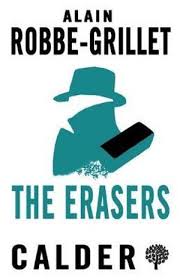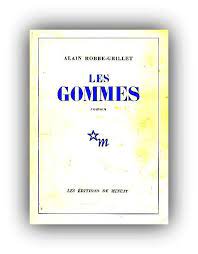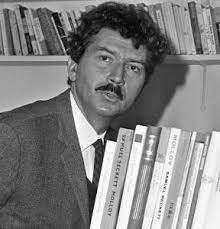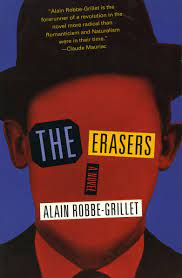Alain Robbe-Grillet, The Erasers (1953).
Good Reads meta-data is 256 pages, rated 3.79 by 1474 litizens .
Genre: krimi; Species: PoMo.
Verdict: Meh.

Spoiler: in which the detective accidentally kills the victim whose murder he has come to investigate. Or did he? Was it no accident, but perhaps a Deep State conspiracy all along? We’ll never know….unless Hillary fesses up.
Detective Wallas comes to a dreary northern city to investigate the shooting of DuPont. We know Bonaventura planned the crime while his henchman Gatineau pulled the trigger. The story is pieced together from the points of view of these four and also Fabius, acting on the orders of the minister, who dispatched Wallas. There is the local copper, Laurent, who is only too glad to turn the inquiry over to him. A doctor, a constable, an innkeeper, and a talkative drunk. By the way, the victim DuPont has much to say, even when he was supposed to be dead. Then there are those erasers.
In his circular, repetitive perambulations around the scene of the crime and the city beyond, Wallas goes into this shop and that, one after another, where to conceal his purpose (gathering information) he buys an eraser for pencil marks. He has several les gommes in his pocket as a result. That quest embodies the story which is repeatedly rubbed out and then started again from a different perspective.

Not much happens and the plot is paper thin but tantalising enough to allow for many speculations about a conspiracy so vast, dark, and deep that it cannot be named. If you have seen L’Année dernière à Marienbad (1961) that is Robbe-Grillet’s work, too. The film is style over substance as a critique of the vacuous lives of its characters, but it is gorgeous to watch and enveloping. Not so these pages.
In 1953 the novel kickstarted Post-Modernism which, regrettably, continues to justify treating readers with derision and contempt.* In these pages everything is circular, not linear and heavy-handed clues to that are conspicuous in names and actions. There are those several narrators who offer different interpretations of the same facts, or different facts. Nor is it certain any of them is reliable. There is no closure at the end. Sounds like a classroom exercise in what not to do in a novel. I found no amusement in reading it but it is well enough written to sustain interest even as it goes around in circles.
I did wonder if I should have read it as a palimpsest of his POW experience (see below) but I got no purchase on that. I tried to read one of his other novels years ago, and failed. This will be my last. He once said that a true writer has nothing to say and he proved it to me with this book.

Robbe-Grillet (1922 – 2008) was born to a comfortable bourgeois family in the provinces, educated and trained as an agricultural engineer and worked on the land for some years after World War II. He was a POW during the war and did slave labour in a German factory. Perhaps the agricultural life expiated those demons. He was not part of the Parisian set but burst onto the scene with this novel. He was soon inducted into the Beau Monde and became a gatekeeper for new writers as an acquisitions editor for a major publisher.
*Has anyone yet coined the term ‘Post-Modernism Syndrome’ to refer to those readers who identify with and like the derision and contempt dished out to them by Po-Mo writers in pointless prose? If not, I claim it now!

